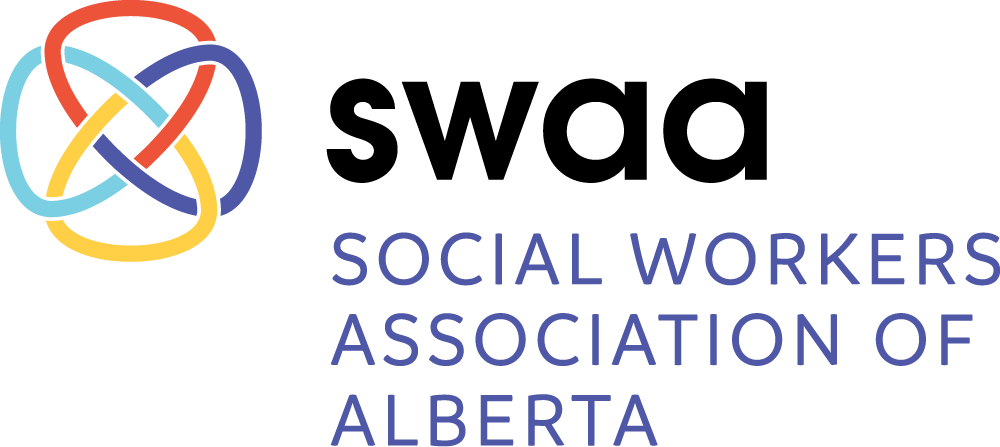
Diversity Policy
for Board and Committees. Approved February 14, 2023.
Scope and Purpose:
The Social Workers Association of Alberta (SWAA) stands against all forms of oppression and discrimination. Diversity and inclusion in SWAA are essential to appropriately reflect and represent the membership and more broadly, society at large.
The focus of this policy is to outline SWAA’s commitment to advancing diversity, equity, inclusion, and decolonization on the Board of Directors (the “Board) and standing committees (“committees”), and on all levels of the organization. This policy is overarching and foundational to ensure that SWAA takes steps to reach out to and engage with diverse groups, create a culture of inclusion, participation, and belonging, particularly for those who are excluded and under-represented. Different forms of oppression require different types of responses and interventions. As such, SWAA commits to continuing to develop specific policies, procedures, and processes. Board and committee related activities will be informed by an anti-oppressive, anti-colonial, anti-racist, anti-patriarchal, and intersectional lens.
Points of Emphasis:
For the purposes of this policy, ‘diversity’ includes those groups identified by the Alberta Human Rights Act. All persons are equal in dignity, rights and responsibilities without regard to: race, religious beliefs, colour, gender, gender identity, gender expression, physical disability, mental disability, age, ancestry, place of origin, marital status, source of income, family status or sexual orientation.
SWAA recognizes the role Social Workers have played (and continue to play) as agents of social control, in peoples’ experience of oppression in Canada, including the treatment of Indigenous Peoples and against other racialized and marginalized groups and communities.
The SWAA acknowledges Canada’s colonial history and its impact on Indigenous peoples and communities and is committed to addressing the impact of colonization through reconciliation and decolonization efforts. To effectively address these efforts, SWAA will utilize the Truth and Reconciliation Calls to Action and the Calls for Justice of the National Inquiry into Missing and Murdered Indigenous Women, Girls.
SWAA’s Commitment to Diversity
SWAA commits to diversify the Board and its committees. Ensuring that the governance structure reflects the diversity of the membership and highlights voices that has less representation and recognition is essential to fulfilling that commitment. SWAA will:
Ensure that equity, diversity, inclusion, and decolonization is an integral component of SWAA culture and activities.
Strive to seek and maintain dedicated directors and committee members from equity seeking groups needing representation in the association.
Seek and engage members from equity-seeking communities to ensure those voices are represented.
Endeavour to increase representation by advocating and creating opportunities for, and with, underrepresented groups within the organization and the profession.
SWAA recognizes the intersectional nature of people’s experiences with oppression. To build inclusive spaces and practices SWAA commits to developing equity-based strategies to build inclusive spaces and practices including board and committee selection, board and committee conduct, and membership engagement.
SWAA commits to learning about and reflecting on the history and impacts of social work on equity seeking groups and provide issues-based learning opportunities to the Board and committees.
When assessing Board and committee composition or identifying suitable candidates for appointment to the Board and committees, SWAA will consider candidates using objective and inclusive criteria and will consider the benefits of diversity and the needs of the organization.
SWAA will be thoughtful and intentional about cultivating a truly inclusive culture within its governance structure; a culture in which every board and committee member’s perspective is welcomed, respected, and valued. Recognizing that Board and committee members from equity seeking groups may feel uncomfortable or unsafe sharing particular aspects of their experiences or perspectives, the Board will strive to foster a space that tackles challenging topics with respect and care. SWAA will develop a process to address comments or behaviours which would lead equity-deserving members to feel unsafe. All discussions and any conflicts will be considered within the context of historical and ongoing systematic oppression.
To ensure the Board has a clear line of sight to diversity, inclusion, decolonization and reconciliation initiatives and that this work receives the attention required to make and evaluate progress, a dedicated report will be added to each regular board meeting agenda and time will be allotted for discussion and questions.
All Board and committee briefing notes will have a section for ‘equity considerations’. This will allow the Board, committees and senior staff to cultivate a deeper understanding of the communities that make up the membership and ensure those perspectives and priorities are part of any strategic discussions when decisions are being made.
The Governance Committee of the Board will review this policy annually to assess its effectiveness in ensuring the diversity of the SWAA Board and committees.
